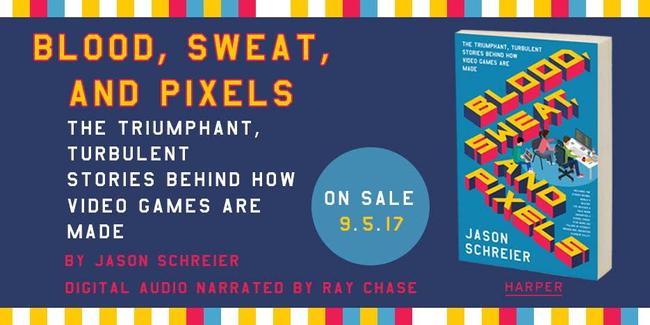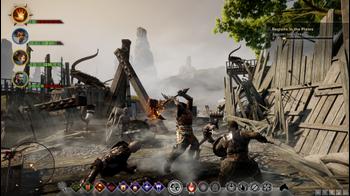Soon you'll be able to listen to Noctis read you tales of The Witcher 3's and Dragon Age's development
Ray Chase, the man behind the excellent English-language voice performance of Noctis (and a lot of other RPG roles), is hopping back into the recording booth to record the audio version of Blood, Sweat, and Pixels: The Triumphant, Turbulent Stories Behind How Video Games Are Made, an upcoming book that tells the stories behind the trials and tribulations of the development of a string of major games, including some recent RPG classics. The voice of the protagonist of a game with a particularly difficult development seems like a pretty fitting match, all things considered.
Well-known press sneak and news hound Jason Schreier of Kotaku has spent over a year writing the book, which dives into the making of games like The Witcher 3, Pillars of Eternity, Dragon Age: Inquisition, and Diablo 3. The book aims to reveal the difficulties and challenges of bringing these experiences into existence.

Schreier didn't initially anticipate releasing an audio version of the book, but found demand from people on twitter was indeed there. Among the calls for an audio book was a tweet from Chase, who jokingly offered to record the book for "a free copy or at least like $5 off" - and Schreier took note. It wouldn't be just a joke for long.
"A few weeks later, I got an e-mail from my editor at HarperCollins telling me that they wanted to do an audio book," Schreier explains. "He said they were working on a list of potential voice actors and asked if I had anyone in mind." What followed was an email exchange that lasted only three hours. It was a pretty fast deal.
"Book publishing moves at a GLACIAL pace, so the fact that we made this happen in three hours -- based on a tweet! -- is remarkable and hilarious," he adds.
The driving force behind the book, Schreier says, is to reveal the nuts and bolts behind the creation of video games. There are a fair number of books about the systems of games and game design as a concept, but not so many that focus on the actual process - and that's where Blood, Sweat and Pixels seems to come in.
"I wrote this book to try to answer the question 'why are video games so hard to make?' I think one of the main reasons is, quite simply, technology," says Schreier. "No other form of media has to deal with the challenges that come with interactive entertainment."

The book deals with a number of questions relevant to RPG fans, especially around the development of big-name RPGs of varying budgets like The Witcher 3, Pillars of Eternity, Diablo 3 and Dragon Age: Inquisition. We all know about how Inquisition was the first Bioware title to use DICE's Frostbite engine, for instance, but Schreier's book dives deep into just how difficult it was taking a game engine built for first person shooting then twisting it to fit the systems and conventions of the RPG genre.
"Things that one might take for granted, like showing a player character's animation or keeping track of an inventory system, didn't even exist on Frostbite," the new author teases. "As a result, BioWare's tools for making Dragon Age: Inquisition were volatile for a very long time. A whole lot of features, like the "power" system, weren't even finalized until the last year of development!"
Many of you are likely familiar with Schreier's work over on Kotaku, where he's built a reputation for being a fierce news hound, breaking stories publishers would rather you didn't hear such as the recent mega-bummer revelation that after Andromeda, the Mass Effect series is on ice. If you're familiar with his work there, much of Blood, Sweat and Pixels may feel familiar - in a good way.
"Because each chapter tells a different story, the writing and reporting process actually wasn't very different from writing a bunch of long Kotaku articles," he reveals. "They're all sort of Mega-Kotaku articles. Since all 10 chapters are based on interviews I conducted myself, my workflow was very similar: I'd interview, transcribe, outline, and then write each story, with plenty of rewrites, edits, and fact-checking along the way. It was very time-consuming (especially since I was working on nights/weekends on top of my day job at Kotaku) but ultimately rewarding."
Blood, Sweat, and Pixels: The Triumphant, Turbulent Stories Behind How Video Games Are Made comes out on September 5th. You can preorder the book at Amazon.